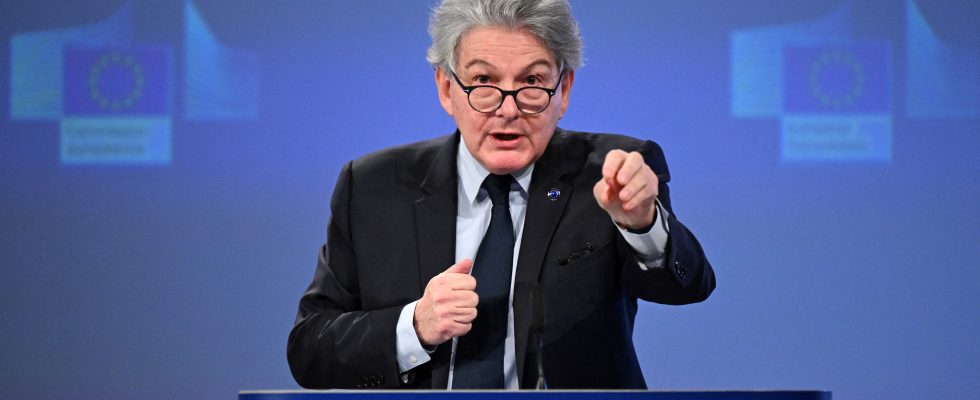The words click like cannon shots. “Vladimir Putin’s Russia has become a methodical actor in the destabilization of the world which does not hesitate to threaten its environment but also more directly our interests,” declared Emmanuel Macron martially. While the head of state no longer hesitates to talk about sending troops to Ukraine, on the economic front too, the tone has gone up a notch. In Brussels, another Frenchman, Thierry Breton, the European Commissioner for Industry and Digital, is in charge. “We must move to a war economy” declared emphatically the former director of Atos, self-proclaimed Defense Commissioner.
European arms factories may be running at full capacity, but they are unable to increase production rates sufficiently to meet needs. Volodymyr Zelensky, the Ukrainian president, even recently affirmed that of the million shells promised by Europe a year ago, only 30% would have been delivered. Even if this figure is contested by Thierry Breton, the delivery delays are obvious. The European arms industry is certainly powerful, but it is still too fragmented and poorly organized to respond to these mass orders.
As a result, since the start of the war in Ukraine, nearly three quarters of the weapons purchased by the 27 member states have been from non-European and largely American companies… In the opposite camp, Vladimir Putin has reoriented its economic machine in record time: military spending now represents almost 30% of state spending and nearly 6% of the country’s GDP.
Europe’s response? The Breton plan, which aims to repeat in terms of defense what it achieved with vaccines at the time of Covid. With a simple idea: pool our strengths. For example, signing advance purchase contracts with arms manufacturers, as we did with pharmaceutical laboratories four years ago, in which the European Union would advance money to manufacturers, allowing them to ‘invest faster and more widely in new factories and new equipment. Or subsidize the relocation of certain activities which have disappeared in Europe. Like powder production – very useful for cannons! – of which our supplies come largely… from China. Here again, the parallel with the relocation of paracetamol or active ingredient factories is striking.
Where to find 100 billion?
Problem is, the Breton plan risks coming up against a dry reality: money. To enable the rise of our defense industry, at least nearly 100 billion euros would be needed, according to estimates by the European Commission. However, almost everywhere on the Continent, the careful use of public funds – not to mention budgetary rigor – is on the agenda of all governments. In France, where Bercy lives under threat from rating agencies, Bruno Le Maire recently announced 20 billion euros in additional savings in public spending this year.
So where to find the money? This is where you need to look in the rearview mirror. Throughout history, a “war economy” has always relied on three levers of economic policy, activated in turn, sometimes all three simultaneously. Money printing, forced savings and taxes. In 1942, the US Congress passed a law authorizing the Federal Reserve to directly purchase Treasury bonds while Roosevelt, in 1944, raised the tax rate on the “super rich” to nearly 94%. In France, at the time of the First World War, the State encouraged the population to “offer their gold” to finance the war effort and the Minister of Finance at the time, after months of fierce political battles, invented the first tax on profits. In 1941, it was through banking regulation that the State required banks to invest nearly 60% of their assets in public debt securities.
Today, France dreams of a new major European loan. But the 27 member states have so far proven incapable of finding the revenue necessary to repay the previous large European loan of 750 billion euros, launched in July 2020 at the time of Covid. European treaties prohibit direct financing of States by the European Central Bank, effectively limiting the weapon of money printing. As for tax increases, in France, the subject is radioactive. That leaves household savings. In France, the subject of directing Livret A funds to arms manufacturers has been under discussion for months. The Constitutional Council has already rejected a first bill. And a new text born in the Senate in recent days is again on the table, but Bercy is putting on the brakes…
To rearm Europe and intensify support for Ukraine, one of these three obstacles will eventually have to be overcome. Otherwise, Europeans will be left with nothing but words and chin thrusts.
.
